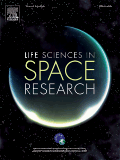
Life Sciences in Space Research
Scope & Guideline
Exploring the Frontiers of Life Beyond Earth
Introduction
Aims and Scopes
- Bioregenerative Life Support Systems:
The journal emphasizes research on bioregenerative life support systems, focusing on how biological processes can be utilized to sustain human life in space. This includes studies on plant growth, microbial interactions, and nutrient recycling. - Radiation Effects and Countermeasures:
A core focus of the journal is the investigation of space radiation and its biological effects. This includes research on radiation-induced health risks, the development of protective measures, and studies on radiation's impact on various physiological systems. - Human Health and Performance in Space:
The journal addresses the physiological and psychological challenges faced by astronauts during space missions. This includes studies on neuro-ocular syndrome, musculoskeletal health, cognitive function, and mental health, aiming to improve astronaut performance and wellbeing. - Microgravity and its Biological Impacts:
Research on the effects of microgravity on biological systems is a significant area of focus. This encompasses studies on cellular responses, gene expression, and the physiological adaptations of various organisms, including plants and animals, in reduced gravity environments. - Astrobiology and Planetary Protection:
The journal also explores astrobiology and the implications for planetary protection. This includes studies on extremophiles, the potential for life on other planets, and the ethical considerations of contaminating extraterrestrial environments.
Trending and Emerging
- Innovative Countermeasures for Space Health:
Recent studies are increasingly focused on developing innovative countermeasures to mitigate health risks associated with spaceflight, such as neurostimulation techniques and biophysics of medications tailored for microgravity. - Sustainable Food and Water Systems for Space Missions:
Research on sustainable food and water systems is on the rise, with a focus on bioregenerative systems that recycle nutrients and cultivate food in space. This trend is crucial for long-duration missions on Mars and beyond. - Microbiome Research in Space Environments:
There is an emerging interest in understanding the gut microbiome and its implications for astronaut health. Studies examining the effects of microgravity on microbial diversity and function are becoming more prevalent. - Psychological and Cognitive Health of Astronauts:
Research addressing the psychological and cognitive health of astronauts is gaining traction. This includes studies on social isolation, cognitive performance, and mental health interventions tailored for space missions. - Advancements in Radiation Measurement and Protection:
With the increasing recognition of radiation risks, there is a growing emphasis on advancements in radiation measurement technologies and protective strategies to safeguard astronauts during missions.
Declining or Waning
- Traditional Biomedical Research:
There has been a noticeable decrease in studies focusing solely on traditional biomedical research unrelated to space environments. As the emphasis shifts towards space-specific challenges, research that does not directly relate to space conditions is becoming less prominent. - General Agricultural Practices:
Research on general agricultural practices that do not consider the unique challenges of space environments is waning. The journal is increasingly prioritizing studies that specifically address plant growth in microgravity or other space-related conditions. - Basic Biological Mechanisms:
While foundational biological research remains important, there is a reduction in publications solely dedicated to basic mechanisms without direct relevance to spaceflight. The journal is favoring applied research that links biological processes to space exploration challenges.
Similar Journals

Journal of Radiation Protection and Research
Navigating the Future of Radiation Health ResearchJournal of Radiation Protection and Research, published by the Korean Association of Radiation Protection (KARP), serves as a pivotal platform for disseminating innovative research in the fields of radiation safety and health-related issues. With an ISSN of 2508-1888 and an E-ISSN of 2466-2461, this South Korea-based journal aims to bridge the gap between scientific research and practical application, emphasizing radiation protection, environmental health, and public safety. Though categorized in Q4 for Health, Toxicology and Mutagenesis, and Q3 for several other scopes as of 2023, the journal is dedicated to publishing high-quality studies that contribute to the improvement of safety standards and methodologies in radiation practice. The journal also provides valuable insights for practitioners in the healthcare and environmental sectors, making it an essential resource for researchers, professionals, and students alike who aspire to advance their understanding and application of radiation science. As the field evolves, so does the Journal of Radiation Protection and Research, which seeks to foster a collaborative and innovative academic community dedicated to ensuring safe and effective radiation use.

NPJ Microgravity
Exploring the Frontiers of Microgravity ResearchNPJ Microgravity, published by NATURE PORTFOLIO, is a premier open-access journal dedicated to advancing research in microgravity environments, complementing extensive studies in fields as diverse as Agricultural and Biological Sciences, Biochemistry, Materials Science, Medicine, Physics, and Space and Planetary Science. Since its inception in 2015, the journal has rapidly established itself as an influential platform for disseminating cutting-edge research, evidenced by its Q1 quartile rankings across multiple disciplines and impressive Scopus rankings, including a top 10 placement in Physics and Astronomy. Based in the United Kingdom with an address of HEIDELBERGER PLATZ 3, BERLIN 14197, GERMANY, NPJ Microgravity not only champions innovative studies but also promotes collaborations that can translate scientific knowledge into tangible benefits for society. As an open-access journal, it offers unparalleled accessibility to high-quality research, making it an essential resource for researchers, professionals, and students with a keen interest in the applications and implications of microgravity research.

Space: Science & Technology
Exploring New Horizons in Space ScienceSpace: Science & Technology is a premier, open-access journal published by the American Association for the Advancement of Science, dedicated to advancing knowledge in the rapidly evolving fields of aerospace engineering and space sciences. Since its inception in 2021, the journal has rapidly established itself as a vital resource, achieving an impressive Q1 ranking in Aerospace Engineering and Q2 ranking in Space and Planetary Science as of 2023. With a Scopus rank placing it 45th out of 153 in Aerospace Engineering and 47th out of 104 in Space and Planetary Science, it serves as a critical platform for researchers, engineers, and students alike to disseminate their findings and engage with the latest developments in their field. The journal encourages innovative research articles, technical notes, and reviews that push the boundaries of what's possible in space exploration and technology. With its commitment to open access since 2021, Space: Science & Technology ensures that pioneering research is readily available to a global audience, promoting collaboration and knowledge sharing in an increasingly interconnected scientific community.

Open Astronomy
Transforming Astronomical Insights into Accessible Knowledge.Open Astronomy is a pioneering journal dedicated to the expansive field of astronomy and astrophysics, published by De Gruyter Poland Sp. z o.o. since 2016. This Open Access journal aims to facilitate the dissemination of high-quality research and stimulate scholarly dialogue among researchers, professionals, and students on a global scale. With a commitment to fostering the accessibility of academic knowledge, Open Astronomy has established itself within reputable categories, achieving a Q3 ranking in Astronomy and Astrophysics and a Q4 position in Space and Planetary Science for 2023. The journal also ranks 66th out of 90 in the Astronomy and Astrophysics category and 84th out of 104 in Space and Planetary Science according to Scopus metrics, indicating its growing influence in the scientific community. Based in Warsaw, Poland, Open Astronomy invites contributions that explore novel discoveries, innovative methodologies, and theoretical advances in the field, making it a vital resource for anyone passionate about the cosmos.

ORIGINS OF LIFE AND EVOLUTION OF BIOSPHERES
Exploring the Intersections of Life and Planetary EvolutionOrigins of Life and Evolution of Biospheres is a distinguished academic journal published by Springer, dedicated to exploring the intricate connections between biological evolution and planetary sciences. Since its inception in 1984, this journal has served as a vital platform for interdisciplinary research, fostering a deeper understanding of the origins and development of life on Earth and beyond. With an Impact Factor reflective of its rigorous scholarly contributions, Origins of Life is currently ranked Q3 in multiple categories, including Ecology, Evolution, Behavior and Systematics, Medicine (miscellaneous), and Space and Planetary Science. With a commitment to advancing knowledge in these crucial fields, the journal caters to a diverse audience—ranging from researchers and professionals to students—who are keen on delving into the complexities of life's evolution in relation to ecological and extraterrestrial contexts. Although the journal is not open access, its critical insights drive significant academic discourse and innovation, making it an essential resource for those dedicated to understanding the biospheric processes that shape the living world.

JOURNAL OF THE ASTRONAUTICAL SCIENCES
Charting New Territories in Aerospace EngineeringJOURNAL OF THE ASTRONAUTICAL SCIENCES, published by Springer Heidelberg, serves as a leading platform dedicated to advancing the fields of aerospace engineering and planetary science. With an ISSN of 0021-9142 and an E-ISSN of 2195-0571, this journal has established a significant presence within the academic community, evidenced by its categorization in the Q2 and Q3 quartiles for 2023, positioning it among the top publications in its field. The journal encompasses a spectrum of research that spans from innovative aerospace technologies to the exploration of planetary systems, reflecting its rich scope developed since its inception in 1969. Although not Open Access, it provides vital contributions to ongoing discussions in aerospace research, appealing to researchers, professionals, and students eager to deepen their understanding of astronautics. With a notable impact factor and rankings in Scopus—66th in Aerospace Engineering and 64th in Space and Planetary Science—this journal continues to be a pivotal resource for those engaged in the exploration and utilization of space.
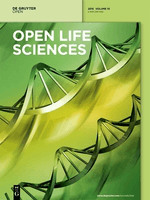
Open Life Sciences
Connecting Researchers to a World of DiscoveryOpen Life Sciences is a distinguished open-access journal published by DE GRUYTER POLAND SP Z O O, dedicated to advancing research across diverse disciplines in the life sciences. Since its inception in 2014 and transitioning to open access in 2015, the journal has become a pivotal platform for researchers, fostering the dissemination of high-quality scientific work while ensuring that valuable findings are freely accessible to the global community. With an impressive categorization into Q2 in Agricultural and Biological Sciences and Q3 in several other fields including Biochemistry and Immunology as of 2023, Open Life Sciences promotes innovation and knowledge sharing across its broad spectrum of topics. The journal's commitment to excellence is reflected in its competitive Scopus rankings, making it an essential resource for professionals and students alike who are keen to stay at the forefront of life sciences research.
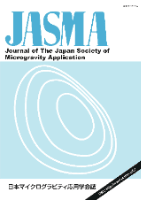
International Journal of Microgravity Science and Application
Exploring the Frontiers of Microgravity ScienceInternational Journal of Microgravity Science and Application is a pivotal academic publication dedicated to advancing the understanding and applications of microgravity phenomena across a plethora of scientific disciplines. Published by the Japan Society for Microgravity Application, this journal serves as a vital platform for researchers and practitioners aiming to explore the complexities and unique opportunities presented by microgravity environments. While primarily focused on the fields of materials science, fluid dynamics, and biological studies under microgravity conditions, the journal fosters interdisciplinary discussions and innovative research endeavors that can translate into real-world applications and technological advancements. Despite its non-open access model, the journal continues to be an invaluable resource for those engaged in space research and microgravity applications, thus contributing significantly to the scientific community's understanding of these essential topics.
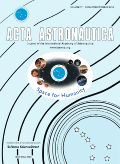
ACTA ASTRONAUTICA
Exploring the Frontiers of Aerospace InnovationACTA ASTRONAUTICA is a premier journal in the field of aerospace engineering, dedicated to advancing knowledge in space exploration and technology. Published by PERGAMON-ELSEVIER SCIENCE LTD in the United Kingdom, this journal boasts a prestigious Q1 ranking within its category as of 2023, positioning it in the top tier of aerospace engineering publications. With an ISSN of 0094-5765 and an E-ISSN of 1879-2030, ACTA ASTRONAUTICA has been a crucial resource for researchers and professionals since its inception in 1974, continuing to publish cutting-edge research through to 2024. The journal focuses on a wide range of topics, from orbital mechanics and spacecraft design to astronautics and planetary science, aiming to inspire innovation and facilitate the exchange of ideas among scholars, industry experts, and students. ACTA ASTRONAUTICA is ranked 19th out of 153 in its field, highlighting its importance and influence within the aerospace community. Researchers seeking a reputable platform to share their findings will find this journal to be an essential part of the academic discourse in aerospace engineering.
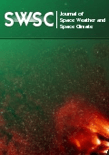
Journal of Space Weather and Space Climate
Exploring the Cosmos: Unraveling Space Weather and Climate InteractionsThe Journal of Space Weather and Space Climate is a premier, internationally recognized open-access journal published by EDP Sciences S A, dedicated to advancing the understanding of the intricate interactions between solar and geophysical phenomena. With an ISSN of 2115-7251, this journal has been at the forefront of research since 2011, fostering discussions and disseminating findings related to atmospheric and planetary sciences. The journal ranks in the top quartile for both Atmospheric Science and Space and Planetary Science, highlighting its critical role in the academia with Scopus rankings placing it at #24 out of 104 in Space and Planetary Science and #35 out of 148 in Atmospheric Science. Based in France, it offers seamless access to cutting-edge research, motivating researchers, professionals, and students to contribute to the growing knowledge in this vital field. The journal's commitment to open access ensures that impactful research reaches an extensive audience, promoting collaborative efforts to tackle issues related to space weather and climate change.